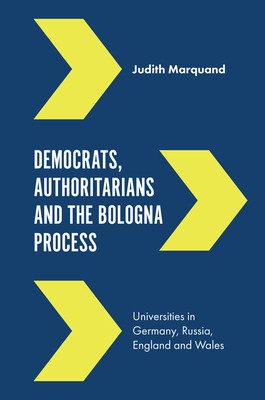
- We will send in 10–14 business days.
- Author: Judith Marquand
- Publisher: Emerald Publishing Limited
- ISBN-10: 1787434664
- ISBN-13: 9781787434660
- Format: 15.2 x 22.6 x 2.3 cm, kieti viršeliai
- Language: English
- SAVE -10% with code: EXTRA
Democrats, Authoritarians and the Bologna Process (e-book) (used book) | bookbook.eu
Reviews
Description
The Bologna Process, initiated in 1999, now includes 47 member countries of the Council of Europe. In 2010, it was renamed 'the European Higher Education Area', it was expanded. It now attracts the interest of many countries around the world.
Without sanctions, it has transformed the structure of higher education in its member states, to allow comparability of their higher education outcomes and encourage increased mobility between them. Increasingly, it has encouraged the use of learner-centred methods of teaching. It now attempts to further other democratic social objectives as well. Despite growing authoritarianism and populism in some of its member states, it may yet survive because of their strong motivation to pursue economic development through increased technological and innovative capacity.
This book sets this extraordinary phenomenon in its historical and political context. After describing the underpinnings and the development of the central Bologna Process itself, four contrasting country case studies - Germany, Russia, England, Wales - illustrate some of the varying responses adopted when faced with a similar framework.
The book will appeal to those interested in the social and political contexts in which higher education is set, as well as practitioners and researchers.
EXTRA 10 % discount with code: EXTRA
The promotion ends in 21d.02:22:12
The discount code is valid when purchasing from 10 €. Discounts do not stack.
- Author: Judith Marquand
- Publisher: Emerald Publishing Limited
- ISBN-10: 1787434664
- ISBN-13: 9781787434660
- Format: 15.2 x 22.6 x 2.3 cm, kieti viršeliai
- Language: English English
The Bologna Process, initiated in 1999, now includes 47 member countries of the Council of Europe. In 2010, it was renamed 'the European Higher Education Area', it was expanded. It now attracts the interest of many countries around the world.
Without sanctions, it has transformed the structure of higher education in its member states, to allow comparability of their higher education outcomes and encourage increased mobility between them. Increasingly, it has encouraged the use of learner-centred methods of teaching. It now attempts to further other democratic social objectives as well. Despite growing authoritarianism and populism in some of its member states, it may yet survive because of their strong motivation to pursue economic development through increased technological and innovative capacity.
This book sets this extraordinary phenomenon in its historical and political context. After describing the underpinnings and the development of the central Bologna Process itself, four contrasting country case studies - Germany, Russia, England, Wales - illustrate some of the varying responses adopted when faced with a similar framework.
The book will appeal to those interested in the social and political contexts in which higher education is set, as well as practitioners and researchers.


Reviews